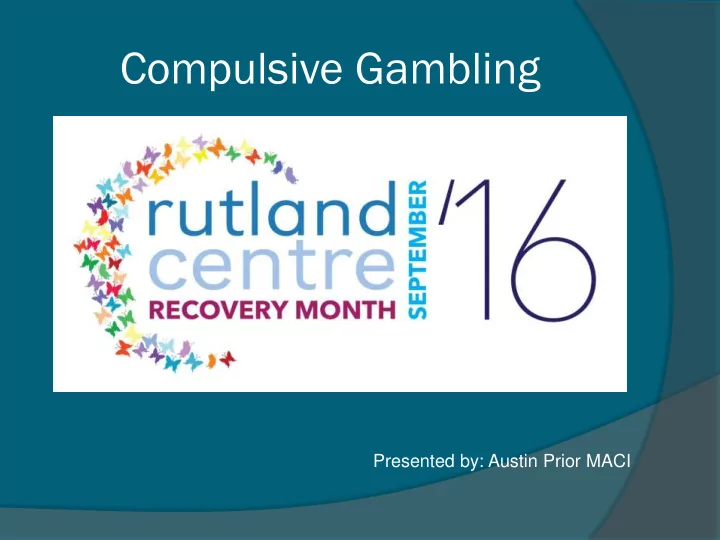

Compulsive Gambling Presented by: Austin Prior MACI
Ga Gamblin ling g St Statisti tistics cs 5 million compulsive gamblers in the US. 15 million problem gamblers. Each compulsive gambler impacts on 4-6 other people. Average compulsive gambler owes about 1 years salary. Estimated 40,000 problem gamblers in Ireland.
Ga Gamblin ling g St Statisti tistics cs Henrietta Bowden Jones – UK Problem Gambling Clinic............. Estimated 500,000 problem gamblers in the UK. 84% Have committed illegal acts to fund gambling Average Onset – 21 years of age 51% have lost their partner 18% have lost their jobs Average loss £151k
Ga Gamblin ling g Fact cts Problem Gambling seems to be more common among adolescents (at least double the adult prevalence rate) Affect disorders: depressions, anxiety and bipolar disorders appear high among problem gamblers ADD, PTSD and Substance Abuse Disorders seem unusually common to the problem gambling population Suicide attempt rates have been reported as high as 15-20% of those who present for care
Comparison to Substance Abuse Similarities Differences ○ Loss of Control ○ Unpredictable outcome ○ Fantasies of success ○ Preoccupation ○ No biological test ○ Negative impact on ○ Easier to hide major life areas ○ Gambling is not self- ○ Tolerance limiting ○ Impact on Family ○ Behavior not attributable to intoxication ○ Emotional/spiritual ○ More intense sense of impact on the shame and guilt individual ○ Greater denial and ○ Withdrawal Symptoms stronger defenses ○ Greater financial problems ○ Self-help groups ○ Intensity of family anger ○ Less public awareness and acceptance
Some common personality traits ..... achievement, Feelings of low self- esteem, exhibitionism, poor self-image, dominance, Feelings of escapism, inadequacy and magical thinking. inferiority.
Compulsive Gamblers learn early to..... Avoid responsibility Avoid conflict Avoid frustration Cannot tolerate boredom Continuously crave excitement First Big High = First Big Win
Co Compulsi pulsive e Ga Gambli bling ng ESCAPE GAMBLERS ACTION GAMBLERS LUCK SKILL Often Female More Males Less Competitive Very Competitive Passive Play Games of Skill Luck Games Seek the rush of gambling Seek Escape Similar to Cocaine addicts Similar to narcotic addicts The Rush Escape While Gambling – nothing hurts. Even chronic pain goes away. Numbing Quality. Altered State – 1 st loss – perception of time.
Compulsive Gambling: Escape Gambles as a way of escaping from problems or relieving feelings of helplessness, guilt, anxiety or depression Chasing After losing money gambling, often returns another day in order to get even Lying Lies to family members, therapists, or others to conceal the extent of involvement with gambling
The progression...... The Adventurous or Winning Phase 1. Gambling is fun, exciting and enjoyable. Feelings of relief from all cares and worries. Usually have a big win early on, then a pattern of winning, losing and breaking even. 2. The Losing Phase or Chase Increasing losses, threat to self-esteem. Borrows money, bets on credit. Fraud, lies, forgery etc all start happening, hiding the losses and loans from others, become loners. Total pre-occupation....depression/irritability/stress....
What to look out for…. Mood swings Changes in behaviour/punctuality etc Unreliability/lack of commitment Changes in friends
Friends must stop....... Looking the other way Making light of the addict’s behaviour Covering up…. making excuses Assuring the addict that everything is fine…. Co-Workers Must Stop Doing the work of the addict; helping the addict finish tasks Covering up the addict’s mistakes and poor performance Lying to the supervisor about the addict’s absence during the work day Making excuses to the addict’s living companion Looking the other way Assuring the addict that certain behaviour is normal
The Family.......... Coping mechanisms..... Effects.... Denial....... Worries/questions Accepts/excuses..Hopes! Stress... Attempts to Arguments/Demands/ control...begins to ......provides bailouts avoid family/friends Exhaustion... Confusion/physical Resentments symptoms Doubt themselves.... Rage/ Anxiety Helpless/hopeless
Recovery..... For the gambler... Gambling MUST stop! Treatment Gamblers Anonymous ??? Other supports For the family..... Stop enabling Seek help Gam-Anon
Ef Effect ects s of Co Compulsiv pulsive e Ga Gambling mbling on F n Fami mily ly
Recommend
More recommend